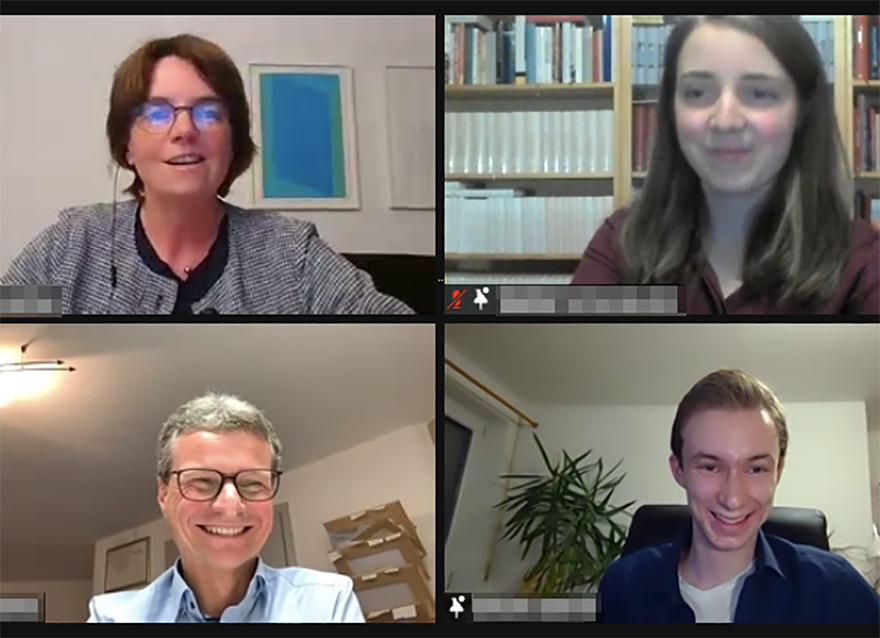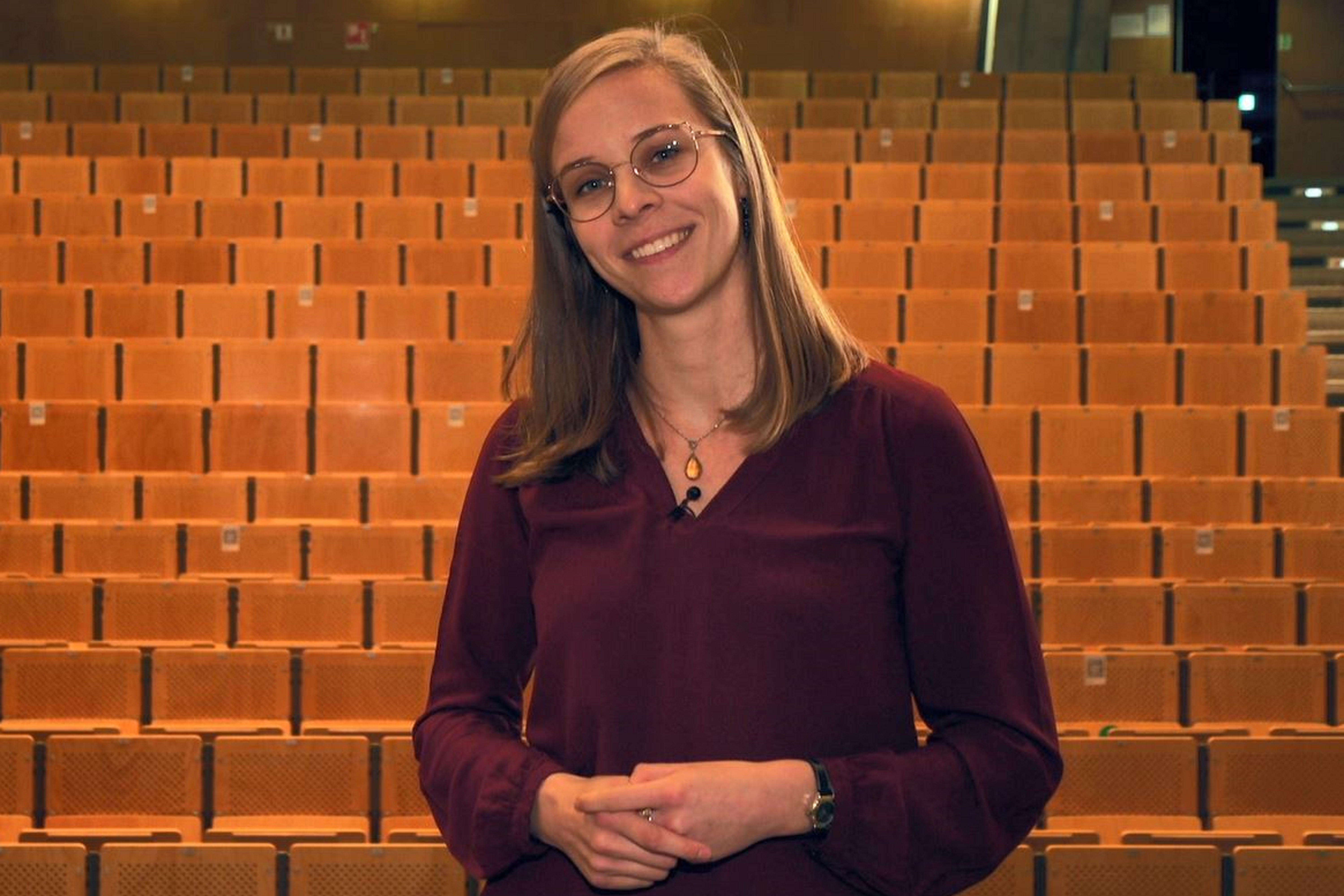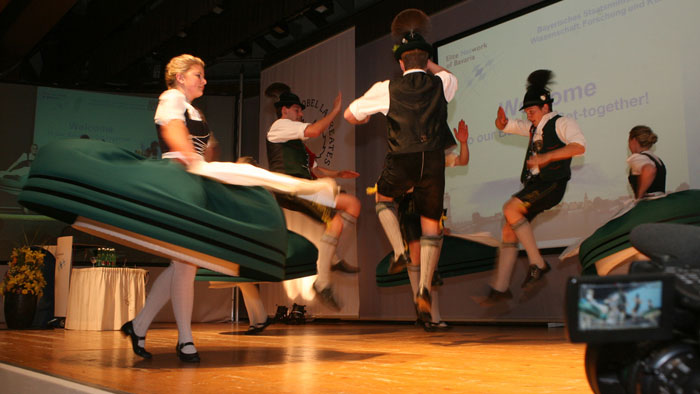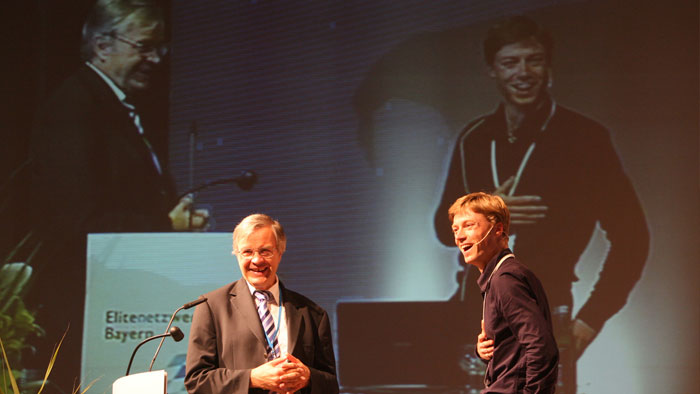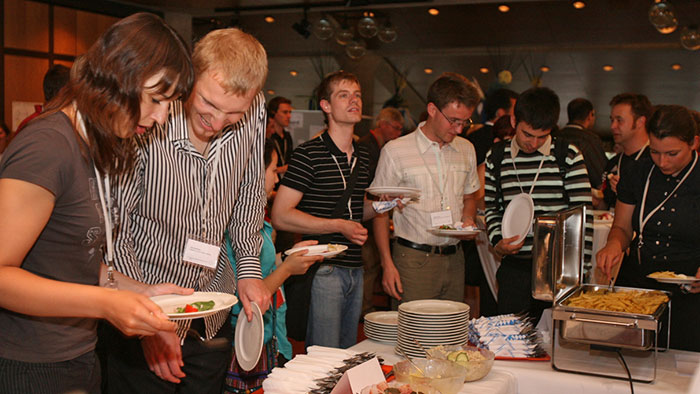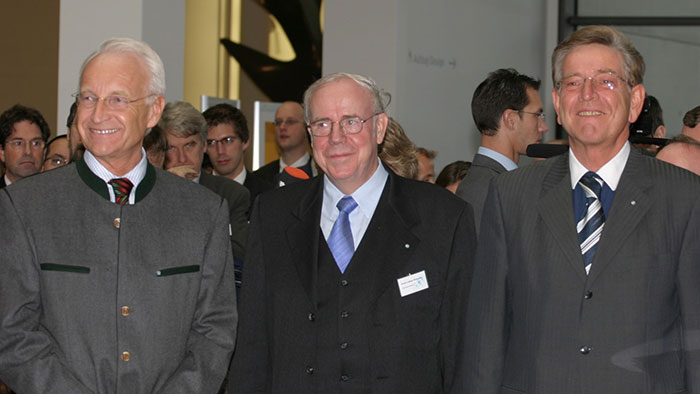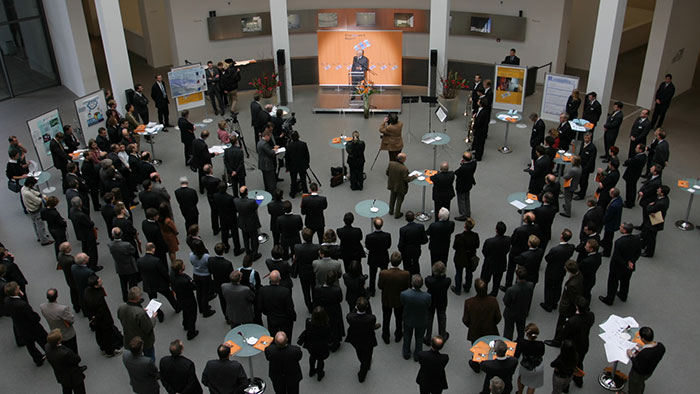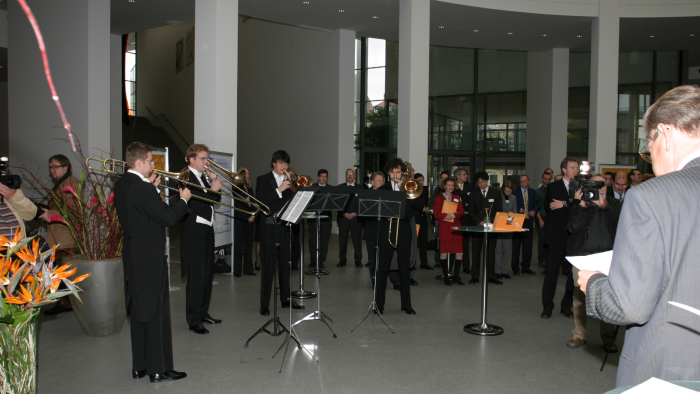History of the Elite Network of Bavaria
Bavaria can look back on a long tradition of support for gifted young people. Indeed, this history extends as far back as 1852, when King Maximilian II of Bavaria founded the Maximilianeum Foundation, which exists to this day. In 1966, the Bavarian state government introduced the Bavarian Act to Promote Gifted Students (BayBFG), another state-funded instrument to support gifted young people in Bavaria. In 2004, a legal reform integrated this law into a new overall concept to support gifted young people. The Elite Network of Bavaria was, and remains, a core element of that concept.
The Elite Network’s 20th anniversary
Under the headline “20 Jahre klug verbunden”, members, friends and supporters of the Elite Network came together at the Munich Residence on 3 May 2025 to look back on two decades of successful support for gifted students in Bavaria and to make important contacts for a promising future for the network. Just in time for the anniversary, the membership mark of 15,000 was also exceeded. Science Minister Markus Blume congratulated the Elite Network as a “Bavarian talent factory”: “Successful founders, award-winning artists, renowned researchers: the alumni and alumnae of our network are shaping the future in Bavaria for Bavaria!”
As a special birthday surprise, the new corporate video of the Elite Network of Bavaria also celebrated its debut on this evening, in which four testimonials from the ranks of the members share their experiences in the Elite Network.
Consistency of change in structural support
Over the course of the year, five new International Junior Research Groups focusing on the natural and life sciences began their work. Another will follow in 2025.
International Junior Research Groups in the spotlight
In the course of the year, three new International Junior Research Groups with a focus on the humanities and social sciences began their work. In addition, new International Junior Research Groups focusing on the natural and engineering sciences, mathematics and computer science as well as the life sciences were announced and selected. The six successful new junior research group leaders will take up their work in the course of 2024.
New coat of paint for the Max-Weber-Program
The Max-Weber-Program’s logo is given an updated color scheme to match the Elite Network's brand label, which was updated in 2022.
The scientific community in lively exchange
In 2023, the Elite Network once again focused intensively on the exchange between its members. In addition to the annual events such as the New Year's reception of the Max-Weber-Program, the Elite Cup and the Get Together for new members, an Elite Network of Bavaria FORUM on the topic of neuroscience was held at the TU Munich and a group of alumni visited the Munich National Theatre.
Networking face to face again
It was particularly pleasing that in 2022 numerous events of the Elite Network of Bavaria could once again take place in presence. While the New Year's reception of the Max Weber Program in January still took place virtually, teams from various programs of the network were finally able to demonstrate their skills on the ball again at the Elite Cup in June 2022. In early summer, the alumni met for a guided tour of the Ohel-Jakob Synagogue in Munich. The new members of the network also came together to find out about their (funding) opportunities in the Elite Network of Bavaria at the Get Together inside the Technical University of Munich, followed by a convivial exchange over music and a buffet. Finally, instead of virtual congratulations in front of their home screens, our graduates received their certificates in person again this year from State Minister Markus Blume.
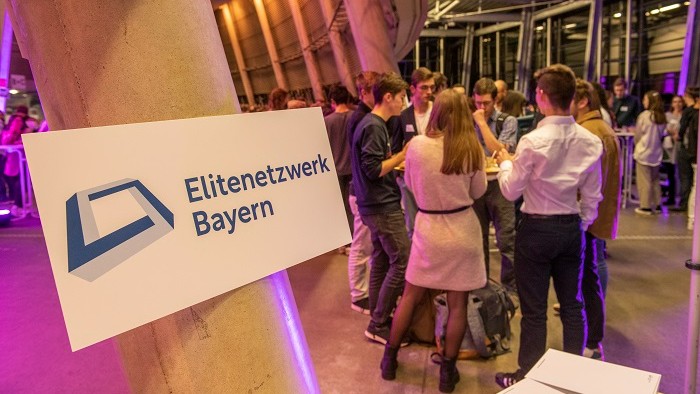
Four new Doctorate Programs
2022 marked the start of four new International Doctorate Programs in Natural Sciences, Engineering, Mathematics and Informatics as well as Life Sciences.
A new look for the Elite Network
In February of this year the new logo was published, giving the Elite Network of Bavaria an up-to-date and distinctive new emblem.
Another challenging year
2021 was another year defined by the ongoing coronavirus pandemic – with new challenges, imponderability and creative ad hoc problem solving.
Three new Doctorate Programs
Nevertheless, three new International Doctorate Programs in the Humanities, Social Sciences and Economics were successfully implemented.
Growth in the Marianne-Plehn-Program
Our new Marianne-Plehn-Program, which continued and replaced our Research Scholarship Program in the previous year, was further implemented. Already half of the one hundred available posts were granted to scholarship holders in the program’s first year.
A part-time employment of 25%, at any Bavarian university, is at the heart of the program. The post is funded by the Elite Network of Bavaria and supplemented by a Bavarian excellence program as well as a PhD scholarship by the German Academic Scholarship Foundation.
Launch of the Dis­tin­guished Pro­fes­sor­ship Pro­gram
The International Commission of the Elite Network of Bavaria with its outstanding scientific expertise has been accompanying the selection process in the new funding program ”Distinguished Professorship“ since 2021. This program was established as part of Bavaria's High-Tech Agenda. The distinguished and independent scientific experts in the International Commission select the best applications to launch distinguished professorships at Bavarian universities.
The aim of the Distinguished Professorship Programme is to support Bavarian universities in attracting particularly outstanding researchers to Bavaria by offering them internationally competitive top conditions.
Net­work­ing in the sec­ond year of the pan­demic
All our events - the Get Together for our new members, the Graduation Ceremony, the New Year Reception or the Max Weber Day for our Max Weber scholarship holders –had to take place online again in 2021. Even though the special moments and memories of face-to-face events are hard to replace, our alternative offers were very popular with our members.
A year full of challenges
At the beginning of the year, nobody could have predicted that 2020 would offer unforeseen challenges - until the corona pandemic made previous plans obsolete.
For example, completely new approaches had to be taken in the organization of network events such as the Get Together for new members, the Graduation Ceremony for the graduates of the Elite Network of Bavaria, or even within the framework of the Soft Skill Seminars. Furthermore, it was necessary to react pragmatically and flexibly to corona-related changes and challenges in the implementation of the individual programs in the five funding lines as well as in the quality assurance of the Elite Network of Bavaria.
Against this background, the successful GoLive of the completely revised website of the Elite Network of Bavaria was all the more gratifying, as was the publication of the newly designed information brochure on the Max Weber Program.
Launch of the Marianne-Plehn-Program
Structurally, the further development of the ResearchScholarshipProgram into the Marianne-Plehn-Program was also completed. Starting this year, the Marianne-Plehn-Program will provide additional support for outstanding young scientists during their PhD scholarship by the German Academic Scholarship Foundation. A part-time employment of 25%, at any Bavarian university, is at the heart of the program.The post is funded by the Elite Network of Bavaria and supplemented by a Bavarian ex-cellence program.
The Elite Network of Bavaria celebrates its 15th anniversary
The Elite Network of Bavaria celebrates its 15th anniversary on May 17th at a festive event at the Max Joseph Hall in the Munich Residence. The five programs of the Elite Network of Bavaria include Elite Graduate Programs, International Doctorate Programs and Junior Research Groups as well as the Max Weber-Program and Research Scholarships. The Elite Network of Bavaria supports exceptionally talented students and young researchers. It now has well over 10,000 members.
In his speech, the Bavarian Minister of Science emphasizes the network concept and the outstanding importance of promoting talented people at the highest level: "The Elite Network of Bavaria is a true success story. I am very proud of what we have achieved over the past fifteen years and we are looking forward to further developing our programs. We need problem solvers and visionaries. They deal with the questions of tomorrow and, with their talents, play a key role in shaping our progress.”
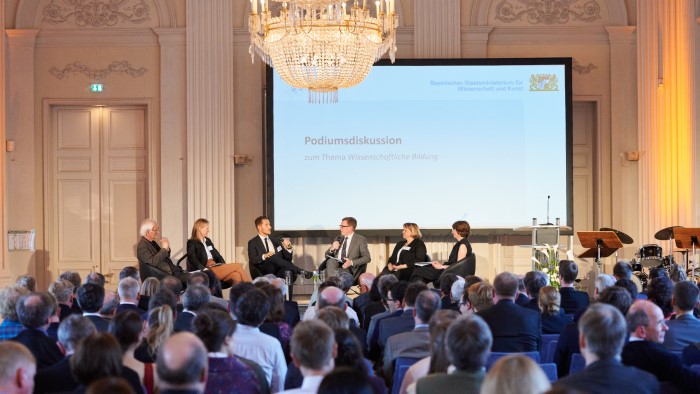
Redeveloping the Research Scholarship program
Following the recommendation of the Elite Network’s full-scale Evaluation Commission, it was decided that the Research Scholarship program should be redeveloped in order to ensure that doctoral researchers continue to enjoy the best possible conditions in future. The aim is to create an innovative and more attractive scholarship program and thereby attract the most talented junior researchers and ensure they remain in academia.
In 2018, after approving a further six Elite Graduate Programs and four Junior Research Groups to join the Elite Network of Bavaria, the Network’s overall portfolio grew further still to include over 50 programs of research and study and around 1,800 Max Weber Program scholarship holders
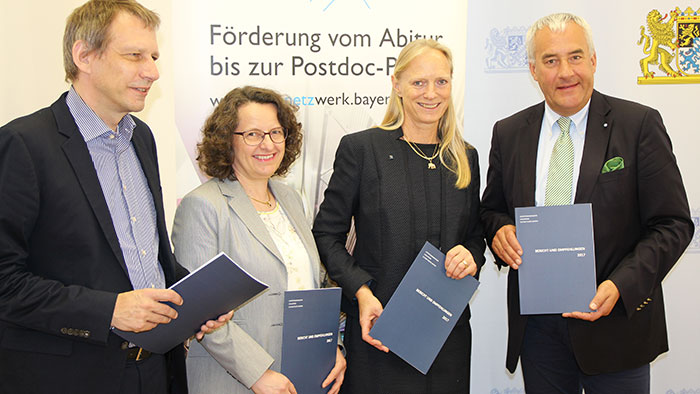
The second full-scale evaluation of the Elite Network of Bavaria was the defining event of 2017. The Commission led by Prof. Birgitta Wolff, President of the Goethe University of Frankfurt am Main, comprised various pre-eminent figures. In its final report, the Commission issued a very positive judgement: “The Commission considers the Elite Network of Bavaria to be utterly exemplary in terms of support for gifted and elite students, and congratulates the Free State of Bavaria on this outstanding program. The Free State of Bavaria has hereby set clearly visible milestones in the academic landscape.”
Support and funding approved for further programs
The feedback received regarding the Elite Network of Bavaria’s funding programs continued to be extraordinarily positive. With this in mind, the Elite Network of Bavaria approved funding for two Junior Research Groups and four new Elite Graduate Programs in the Humanities, Social Sciences and Economics. “In Bavaria, a location for education and research, we attach great importance to providing support for junior academics,” said Science Minister Dr Ludwig Spaenle. “Through the Elite Network of Bavaria, we enable academically outstanding students and researchers from around the world to access attractive career prospects at Bavarian universities and, in doing so, secure the long-term competitive power of the Bavarian academic and industrial sectors.”
In the same year, we approved an application to extend another Elite Graduate Program, with the universities involved providing the financing themselves. This meant that 15 of the 20 Elite Graduate Programs in the first tranche of courses were extended at the end of their ten-year funding term, with ongoing funding provided by the respective universities.
Scholarships’ financial support improved
We increased the financial support provided through scholarships. In October, the Max Weber Program Semester Allowance increased to €1,290 per semester. From November onwards, new Research Scholarships were awarded on the basis of improved conditions, including increased basic funding of €1,400.

New overall concept to support gifted and talented students
Over several months, the State Ministry for Education, Culture, Science and the Arts developed an overarching concept to provide support for gifted students, in which the Elite Network of Bavaria was to play a crucial role. This concept covered the entire school and higher education system. The concept was then introduced at both federal and state level and aims to ensure that no talent is wasted and to actively encourage people to apply their potential, regardless of their social or educational background.
New Elite Graduate Programs set up
Following a call for applications to set up further Elite Graduate Programs in the Natural Sciences, Engineering, Mathematics and Informatics, we approved six new Elite Graduate Programs for funding through the Elite Network of Bavaria.
The Elite Network of Bavaria turns 10
The Elite Network of Bavaria commemorated its tenth year in existence with a celebration at the Nymphenburg Palace. The anniversary event reflected the Elite Network’s networking mindset, bringing leading figures from academia, politics and wider society together with talented students. Science Minister Dr Ludwig Spaenle and State Secretary Bernd Sibler both attended the celebration. “We have been providing talented students with cutting-edge support for ten years through the Elite Network of Bavaria,” they said in an address. “In doing so, we offer support that enables talented young students and researchers from around the world to combine their creativity, passion and inquisitiveness with academic study and to tackle the challenges of tomorrow by pursuing innovative approaches and moving beyond conventional methods.”
and accept
data transfer:
Strategy Group founded
The Elite Network of Bavaria worked to improve its quality assurance measures. In addition to its existing bodies – the International Commission and the Advisory Board – the Strategy Group was established with the aim of addressing overarching structural issues within the Elite Network of Bavaria and helping to further raise quality standards.
Extension phase enabled
We introduced an option to allow universities to extend Elite Graduate Programs which would otherwise end following their ten-year term of funding from the Bavarian State Ministry of Science and the Arts. This option enables Bavarian universities to continue to offer established Elite Graduate Programs under the umbrella of the Elite Network of Bavaria for a limited additional period; during this period, the Elite Graduate Programs remain subject to the Elite Network’s quality controls and are funded by the respective universities. In addition, six International Doctorate Programs concluded at the end of their maximum eight-year term, while four new Doctorate Programs and four Junior Research Groups were approved for funding.
| Academic area | Program | Lead university |
|---|---|---|
| Humanities, Social Sciences and Economics | Incentives – Bavarian Graduate Program in Economics | Friedrich-Alexander University of Erlangen-Nuremberg |
| Natural Sciences | Identification, Optimization and Control with Applications in Modern Technologies | Friedrich-Alexander University of Erlangen-Nuremberg |
| Engineering and Informatics | Materials Science of Complex Interfaces | Technical University of Munich (TUM) |
| NanoCat: Nanodesign of High-Performance Catalysts | Technical University of Munich (TUM) | |
| Quantum Computing, Control and Communication | Technical University of Munich (TUM) | |
| Life Sciences | Protein Dynamics in Health and Disease | Ludwig Maximilian University of Munich |
Junior Research Groups program line launched
The Elite Network of Bavaria introduced a new program line in 2012: Junior Research Groups. This extended the Elite Network’s support and funding from the point pupils leave school through to the postdoc phase. Art historian Dr Philippe Cordez led the first Junior Research Group – Premodern Objects. An Archaeology of Experience – at LMU Munich.
At the launch of the new program, Science Minister Dr Wolfgang Heubisch commented as follows: “Highly qualified junior academics are the most important resource we have for ensuring a viable future for our state. By introducing Junior Research Groups, a fifth funding line under the umbrella of the Elite Network of Bavaria, we are establishing another sustainable method that affords junior academics in Bavaria extraordinary opportunities.”
New International Doctorate Programs approved for funding
After five International Doctorate Programs completed their maximum term of eight years, funding was approved for four new International Doctorate Programs in the Humanities, Social Sciences and Economics.
| Academic area | Program | Lead university |
|---|---|---|
| Humanities, Social Sciences and Economics | Structure, Reactivity and Properties of Oxide Materials | Universität Bayreuth |
| THESIS: Complex Processes in the Earth: Theory, Experiment, Simulations | Ludwig Maximilian University of Munich | |
| Natural Sciences | Lead Structures of Cell Function | University of Bayreuth |
| NanoBioTechnology | Ludwig Maximilian University of Munich | |
| Life Sciences | Lead Structures of Cell Function | University of Bayreuth |
| NanoBioTechnology | Ludwig Maximilian University of Munich |
The Elite Network of Bavaria offered support for schools
For the first time, a Soft Skill Seminar was offered to gifted school pupils in top streams at Bavarian Gymnasium schools through cooperation with the State Ministry for Education and Culture. In addition to early studies, “uni days”, modified final year classes and seminars during school holidays, this event represented a further instrument to support gifted pupils approaching the transition between school and higher education.
The Elite Network also increased the Semester Allowance for Max Weber Program scholarship holders to €900 per semester.
Excellent outcome for the Elite Network of Bavaria
A Commission chaired by Prof. Elmar W. Weiler, Rector of Ruhr University Bochum, conducted the first full-scale evaluation of the Elite Network. The verdict was extremely positive: “In the Elite Network, Bavaria possesses a funding program that binds outstanding talent to Bavarian universities and bears enormous influence.” The report also said that the Free State of Bavaria should firmly maintain the Elite Network of Bavaria and expand it wherever possible. On the basis of the recommendations made by the Commission in its report on the full-scale evaluation, the Free State of Bavaria continued to expand the Elite Network progressively in the years that followed.
Soft Skill Seminars
Soft Skill Seminars are offered through a collaboration between the Elite Network of Bavaria and the Weiterbildungszentrum of LMU Munich. In these sessions, they not only learn key skills but also have the opportunity to become acquainted with other members of the Elite Network of Bavaria.
First Bavarian Night at the Lindau Nobel Laureate Meeting
The Elite Network of Bavaria hosted the first Bavarian Night at the Nobel Laureate Meeting in Lindau. This went on to become an established fixture in the program of events that accompany the annual meeting.
The 1000th scholarship holder
The number of scholarship holders in the Max Weber Program continued to grow. In November, it welcomed its thousandth scholarship holder: Susanne Freund, a student at the of Latin and School Psychology at the Catholic University of Eichstätt-Ingolstadt’s Lehramt für Gymnasien.
Thanks to the Max Weber Program – operated by the German Academic Scholarship Foundation on behalf of the Free State of Bavaria – by 2008, more than 1,000 scholarship holders had benefited from a Semester Allowance, Study Abroad Support and a wide-ranging personal development program.
Further Elite Graduate Programs and Doctorate Programs set up
The 2006/2007 Winter semester saw the launch of further Elite Graduate Programs and International Doctorate Programs. This took the total to 21 Elite Graduate Programs and 11 International Doctorate Programs under the umbrella of the Elite Network of Bavaria.
Advisory Board formed
In 2006, the Elite Network gained a new body: the Advisory Board. The board was created to promote students, graduates and postgraduate researchers on the basis of the Bavarian Act to Promote Elite Students (BayEFG) and contribute to securing the high quality of the Network’s programs. The inaugural meeting of the Advisory Board was held under the chairmanship of Professor Wolfgang Frühwald, President of the Alexander von Humboldt Foundation.
Celebratory send-off for the Network’s first graduates
In a formal ceremony at the Würzburg Residence, the Elite Network of Bavaria celebrated its first 100 graduates, with Science Minister Dr Thomas Goppel also in attendance. The Elite Network holds its graduation celebration in a different Bavarian university city each year.
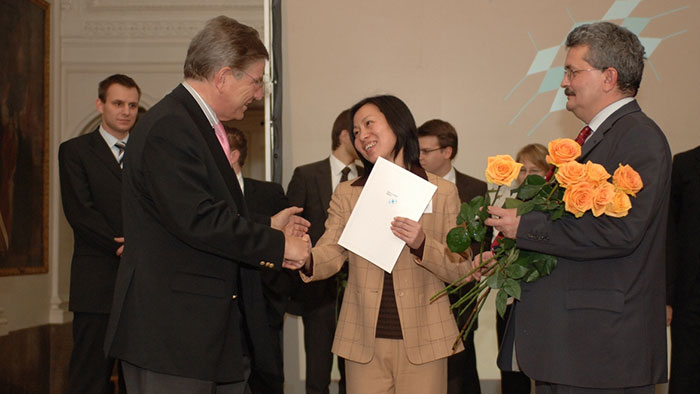
Bavarian state support for gifted students reformed
The Bavarian Act to Promote Elite Students (BayEFG) entered into force on 1 May 2005, replacing the Bavarian Act to Promote Gifted Students (BayBFG). The new act reformed support for gifted and talented students in Bavaria. In the past, the state’s support had been focused on financial aspects; the reform shifted the emphasis to include ideational, personal support. Talented young students began to receive individual support to encourage their personal development.
The Max Weber Program of Bavaria was officially launched with an opening event on 5 December in Nuremberg’s Neues Museum. Attendees included Science Minister Dr Thomas Goppel and the President of the German Academic Scholarship Foundation, Professor Gerhard Roth. In his speech, Dr Goppel stated: “By launching the Max Weber Program, Bavaria is initiating a paradigm shift in support for elite students. Excellence programs are at the heart of this. The general excellence program will include summer academies, language courses, semesters abroad and mentoring.”
The German Academic Scholarship Foundation was tasked with operating the funding program.
Starting gun fired for the Elite Network of Bavaria
On 22 November 2004, the starting gun for the Elite Network of Bavaria was fired at Munich’s Pinakothek der Moderne; in attendance were Minister President Dr Edmund Stoiber, State Minister Dr Thomas Goppel and the Network’s Founding Committee. Representatives of the ten Elite Graduate Programs and six International Doctorate Programs starting in the 2004/05 Winter semester also attended the event.
In his address, Science Minister Dr Thomas Goppel said: “The Elite Network offers the best students and doctoral researchers a stimulating academic environment of the highest level and the opportunity to conduct independent research at an early stage.”
The Elite Network of Bavaria is born
The Elite Network began to take shape over the course of 2003, as the state government and parliament made funding available for 223 high-quality positions. Moreover, thanks to the generous support of the Bavarian Industry Association (vbw), the Elite Network of Bavaria had a budget of €14 million in initial funding at its disposal.
A Commission made up of pre-eminent figures and led by DFG President Prof. Ludwig-Ernst Winnacker closely monitored the development the Elite Graduate Program and International Doctorate Program funding lines, as well as the overall concept for the Elite Network of Bavaria.
An initiative of the Free State of Bavaria
The Elite Network of Bavaria was born in 2002 as an initiative of the Bavarian state government. The Elite Network was created to offer the best possible conditions of research and study high-achieving students and junior academics.
A four-person working group – comprising Professor Helmut Altner, Professor Walter Kröll, Professor Olaf Kübler and the President of the DFG, Professor Ernst-Ludwig Winnacker – was commissioned to draw up initial recommendations for the creation of the Elite Network of Bavaria.


